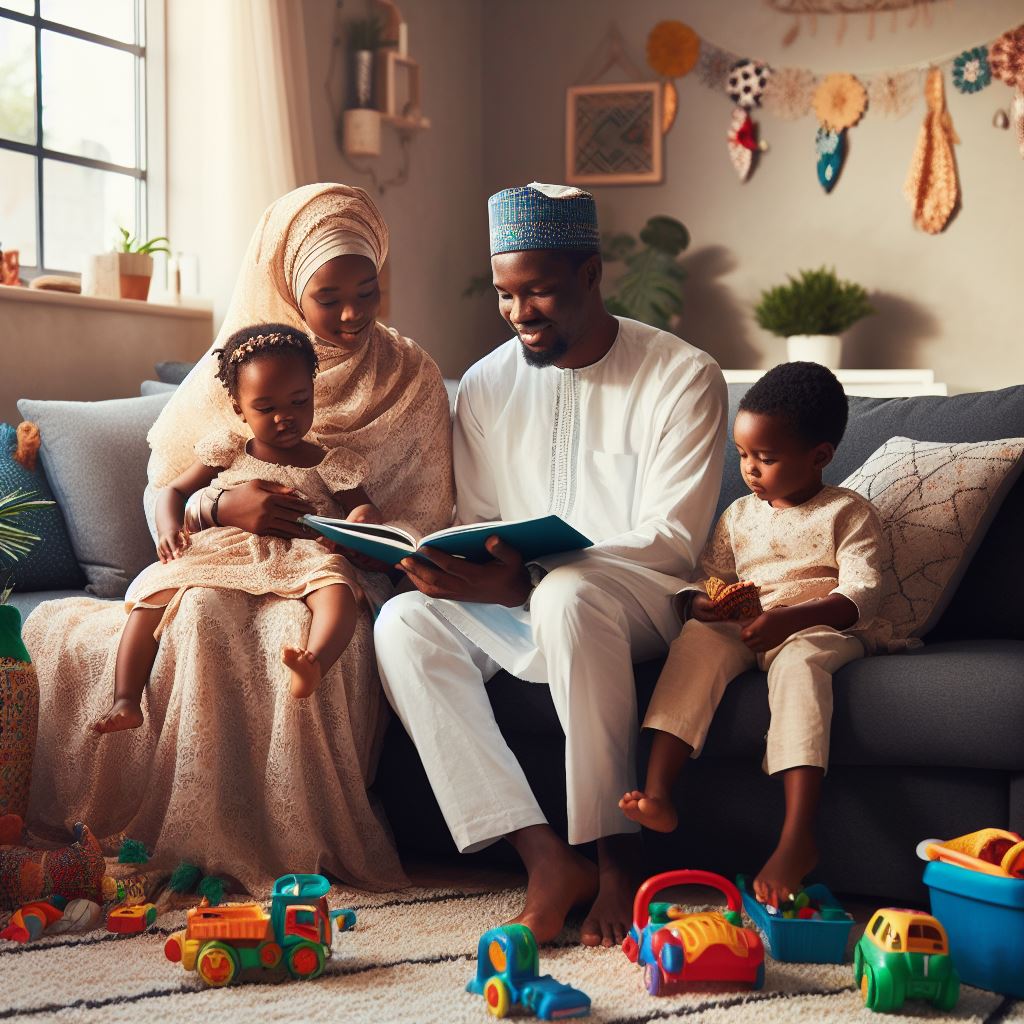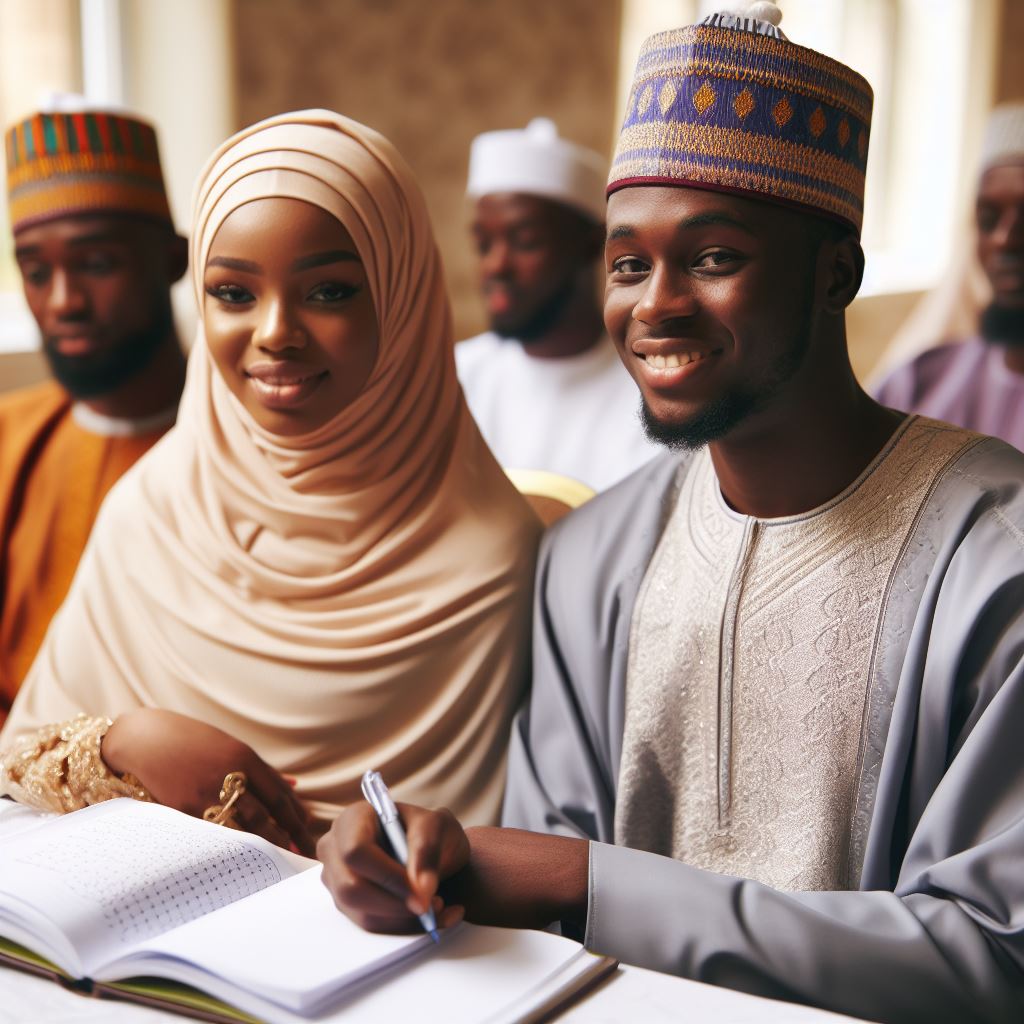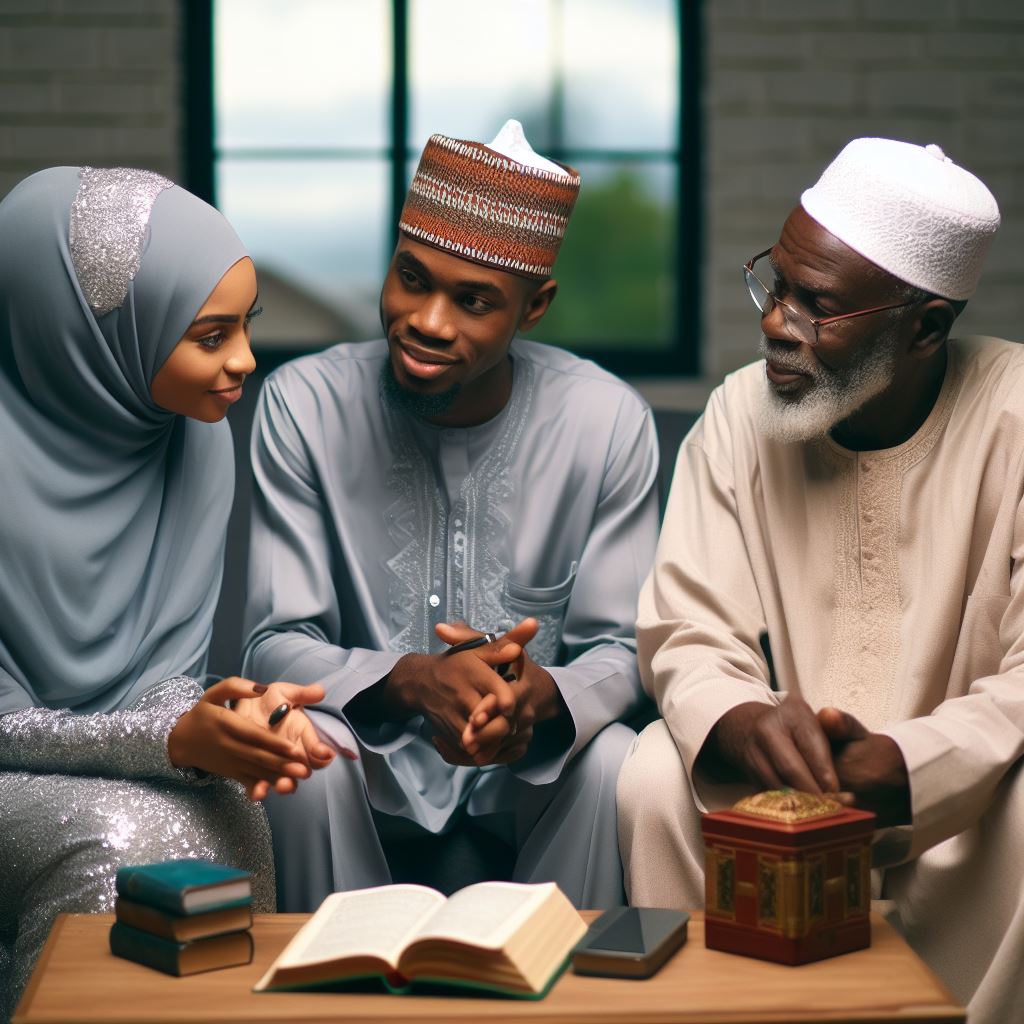Introduction
The rights of children in Islamic matrimony are a critical aspect of family life in Nigeria.
Understanding and addressing these rights within the Nigerian context is of paramount importance.
In this blog post, we will delve into the specific rights children hold in Islamic marriages in Nigeria and explore the significance of this discussion.
Islamic matrimony, with its rich cultural and religious traditions, plays a central role in Nigerian society.
It’s a cornerstone of family life and community values.
However, as society evolves, the rights of children within these marriages must also be reevaluated and protected.
In Nigeria, where a significant portion of the population practices Islam, the discussion of children’s rights in Islamic matrimony is especially pertinent.
It’s essential to address the nuances of how these rights are interpreted and implemented within this unique cultural and religious landscape.
The welfare and development of children are critical to the overall well-being of Nigerian society.
By examining the rights of children in Islamic marriages, we can contribute to a more informed and nuanced discourse on family law, child protection, and religious practices in Nigeria.
In the following sections, we will explore various facets of this topic, shedding light on the legal, cultural, and social dimensions of children’s rights in Islamic matrimony in Nigeria.
Our aim is to foster greater awareness and understanding of this crucial issue and its implications for Nigerian society.
Understanding Islamic Matrimony
Islamic matrimony refers to the marriage contract, which is a sacred and significant institution in the Islamic faith.
It is a lifelong commitment between a man and a woman, based on mutual love, respect, and understanding.
Principles and values that guide Islamic marriages
- Family as the Foundation: Islamic matrimony places great importance on the family unit. It is seen as the foundation of society and the source of love, support, and stability.
- Mutual Consent: The consent of both the bride and groom is essential in Islamic matrimony. The marriage contract must be entered into willingly and voluntarily by both parties.
- Equal Partnership: Islamic marriages emphasize the concept of equality between spouses. Both partners have rights and responsibilities, and decisions are made mutually after consultation and consensus.
- Commitment to God: Islamic matrimony is rooted in a commitment to God. The couple is expected to lead a righteous life, fulfilling their religious duties and practicing the teachings of Islam.
- Procreation and Childrearing: Islam recognizes the importance of having and raising children. It encourages married couples to procreate and fulfill their responsibilities as parents, nurturing and guiding their children in accordance with Islamic values.
Children’s Rights in Islamic Matrimony
- Right to Identity and Name: Children born into an Islamic marriage have the right to be recognized as legitimate members of their family, carrying their father’s name.
- Right to Love and Care: It is the responsibility of both parents to provide a loving and caring environment for their children. They must meet their physical, emotional, and psychological needs.
- Right to Education: Islamic matrimony recognizes the importance of education. Parents are obligated to provide their children with quality education, both religious and secular, to help them develop intellectually and spiritually.
- Right to Protection: Children have the right to be protected from harm, abuse, neglect, and exploitation. Parents are responsible for their safety and well-being.
- Right to Inheritance: Islamic law ensures that children have the right to inherit from their parents, ensuring their financial security and stability.
- Right to Upbringing in Islam: Parents have the duty to raise their children in accordance with Islamic teachings, providing them with proper guidance, religious education, and moral values.
Basically, Islamic matrimony holds significant importance within the Islamic faith.
It is guided by principles of love, equality, and commitment to God.
In such marriages, children have certain fundamental rights, including identity, love, care, education, protection, inheritance, and proper Islamic upbringing.
Understanding and respecting these rights contribute to the well-being and holistic development of children within the context of Islamic matrimony.
Read: Nikah Khutbah: Significance and Common Practices in Nigeria
Rights of Children in Islamic Matrimony
Rights that children are entitled to in Islamic matrimony
- Protection from physical and emotional abuse, neglect, and harm.
- The right to be provided with basic needs such as food, clothing, and shelter.
- Access to education and the opportunity to develop intellectually.
- Receive proper healthcare and medical attention when needed.
- Protection from child labor and exploitation.
- The right to express themselves and have their opinions heard and respected.
- Freedom from discrimination based on gender, race, or social status.
- The right to maintain a relationship with both parents, unless there are valid reasons to limit access.
- Protection from forced marriage or involvement in any harmful cultural practices.
- The right to a safe and nurturing environment conducive to their overall well-being.
- Enjoyment of their childhood and the right to play, relax, and engage in recreational activities.
Importance of nurturing and protecting children within the Islamic marriage framework
Islamic teachings emphasize the significance of nurturing and protecting children within the framework of a strong and loving marriage:
- Children are considered a blessing from Allah, and it is the responsibility of parents to care for and raise them.
- Prophet Muhammad (peace be upon him) emphasized the importance of loving and treating children with kindness.
- Nurturing children within a stable and harmonious marital environment contributes to their emotional and psychological well-being.
- Islam encourages parents to spend quality time with their children, providing guidance and instilling moral values.
- A supportive and healthy marital relationship provides a solid foundation for children to grow and thrive.
These rights include physical and emotional well-being, education, healthcare, and a safe environment.
The rights of children in Islamic matrimony encompass various aspects essential for their overall development:
- Physical and emotional well-being: Children should be raised in an environment free from violence, abuse, and neglect.
- Education: Islamic teachings highlight the importance of seeking knowledge, and parents are obligated to provide education to their children.
- Healthcare: It is the responsibility of parents to ensure their children receive proper medical care and treatment.
- A safe environment: Children have the right to grow up in a secure environment that protects them from harm and danger.
Islam promotes these rights, and Nigerian law also recognizes the importance of safeguarding children’s well-being within the institution of marriage.
As Muslims, it is crucial to understand and uphold the rights of children within Islamic matrimony.
By fulfilling these rights, we ensure a better future for our children and contribute to the growth and prosperity of society as a whole.
Read: Choosing a Spouse in Islam: Criteria and Nigerian Context
Protections Afforded by Nigerian Law
- The legal framework in Nigeria provides extensive protections for the rights of children in Islamic marriages.
- One of the key legislations is the Child Rights Act, which safeguards the welfare and well-being of children.
- Under this act, children are entitled to various rights, including the right to education, health, and protection from abuse.
- The act also prohibits child marriage and sets the minimum age of marriage at 18 years for both boys and girls.
- In addition to the Child Rights Act, the Matrimonial Causes Act also addresses issues related to children in Islamic marriages.
- This act specifies the rights of children in cases of divorce, custody, guardianship, and maintenance.
Enforcement Mechanisms and Penalties for Violations
- To ensure the enforcement of these protections, Nigerian law has established various mechanisms.
- The law assigns the responsibility of protecting children’s rights to government agencies such as the Ministry of Women Affairs and Social Development.
- These agencies have the authority to investigate cases of violation and take appropriate action.
- If someone violates the protections afforded to children in Islamic marriages, they can face severe penalties.
- For example, under the Child Rights Act, anyone who contracts a child marriage can be imprisoned for up to five years or fined.
- The act also imposes penalties on parents or guardians who neglect or abandon their children, ensuring accountability.
By having robust legislation and enforcement mechanisms, Nigeria aims to safeguard the rights of children in Islamic marriages and protect them from harm and exploitation.
These legal protections not only ensure compliance with international standards but also contribute to the overall well-being and development of children in the country.
It is essential for society to be aware of and respect these laws to create a safe and nurturing environment for children in Islamic matrimonies.
Read: Celebrating Walimah: The Sunnah of Islamic Wedding Feast

Challenges Faced by Children in Islamic Matrimony
Acknowledge the existing challenges faced by children in Islamic marriages in Nigeria
- Child marriage: Many children in Islamic matrimony are forced into marriages at a young age, depriving them of their childhood and education.
- Lack of access to education: Children in Islamic marriages often face difficulties in accessing quality education, limiting their opportunities for advancement.
- Limited healthcare access: These children may also lack proper healthcare, leading to compromised physical well-being.
- Psychological well-being: Growing up in an unstable or unhappy marriage can have a severe impact on a child’s mental health and overall well-being.
- Economic challenges: Children in Islamic matrimony may face financial difficulties due to their parents’ limited resources, affecting their basic needs.
Child marriage, lack of access to education or healthcare, and psychological well-being
Child Marriage
- Advocacy and awareness campaigns should be developed to challenge the cultural norms that perpetuate child marriages in Islamic matrimony.
- Strengthening the legal framework to enforce stricter penalties for those involved in child marriages can serve as a deterrent.
Lack of Access to Education
- Implement programs that provide incentives for families to send their children, especially girls, to school.
- Improve infrastructure, teacher availability, and curriculum to ensure quality education is accessible for children in Islamic matrimony.
Lack of Access to Healthcare
- Increase investment in healthcare infrastructure to improve access to medical facilities for children in Islamic marriages.
- Educate parents about the importance of regular healthcare check-ups and ensure affordable healthcare services are available.
Psychological Well-being
- Establish counseling and support services for children in Islamic matrimony to address their emotional and psychological needs.
- Train teachers, parents, and religious leaders to identify signs of distress in children and provide appropriate support.
Implications of these challenges on children’s upbringing and their long-term development
1. Education and Career Opportunities
- Lack of education and early marriage significantly limit the future prospects of children, depriving them of job opportunities and economic independence.
- This perpetuates the cycle of poverty and denies these children the chance to break free from the constraints of their circumstances.
2. Health and Well-being
- Limited access to healthcare and unhealthy living conditions can negatively impact physical health and increase the risk of diseases.
- The absence of proper healthcare and psychological support can contribute to long-term mental health issues.
3. Social Integration
- Children in Islamic matrimony may face social exclusion and limited social interaction, impairing their ability to develop interpersonal skills.
- This isolation can hinder their integration into society and impede their ability to form meaningful relationships later in life.
4. Psychological Impact
- Experiencing a forced or unhappy marriage at a young age can lead to low self-esteem, anxiety, and depression in children.
- These psychological issues can have a lasting impact on their emotional well-being and overall quality of life.
Generally, children in Islamic matrimony in Nigeria face numerous challenges that prevent them from reaching their full potential.
Addressing these issues through legal reforms, educational initiatives, improved healthcare access, and psychological support is crucial for their well-being and long-term development.
Read: The Concept of Polygamy in Islam: Nigerian Perspectives
Efforts to Improve the Rights of Children
Improving the rights of children in Islamic matrimony is a critical issue that requires concerted efforts from various stakeholders.
In Nigeria, both government-led initiatives and community-based efforts have been instrumental in bringing about positive changes in recent years.
Government-led Initiatives
- The Nigerian government has implemented various policies and laws to safeguard the rights of children in Islamic matrimony.
- The Rights of the Child Act of 2003 provides a legal framework for the protection and welfare of children.
- Through such legislation, the government seeks to ensure that children in Islamic marriages are not subjected to harmful practices or denied their basic rights.
- The Ministry of Women Affairs and Social Development plays a crucial role in monitoring and enforcing these laws.
Community-based Efforts
- Communities and organizations have also taken up the responsibility of improving the rights of children in Islamic matrimony.
- NGOs and civil society groups, such as the Nigerian Child Rights Movement, actively advocate for the rights and welfare of children.
- They organize awareness campaigns, workshops, and training sessions to educate parents, religious leaders, and community members about child rights.
- These efforts aim to promote a better understanding of the importance of protecting children and creating a supportive environment for them.
Success Stories and Positive Changes
- Over the years, Nigeria has witnessed success stories and positive changes regarding the rights of children in Islamic matrimony.
- One such success story is the decline in child marriages, thanks to awareness campaigns and stricter enforcement of the law.
- Communities are becoming more aware of the negative consequences of child marriages, such as limited education and increased health risks.
- Education has emerged as a powerful tool in empowering children and breaking the cycle of poverty and inequality.
The Importance of Continued Efforts
Despite these positive changes, it is essential to recognize the importance of ongoing efforts to protect and enhance children’s rights in Islamic matrimony.
- Children continue to face challenges such as child labor, violence, and limited access to healthcare and education.
- Efforts must focus on strengthening the implementation of existing laws, as well as addressing cultural and societal norms that perpetuate the violation of child rights.
- Collaboration between the government, communities, religious leaders, and civil society organizations is crucial for sustained progress.
- Investing in education and skill development programs can empower children to realize their potential and contribute positively to society.
Essentially, improving the rights of children in Islamic matrimony is an ongoing endeavor that requires a multi-faceted approach.
Government-led initiatives and community-based efforts have made significant strides, but there is still much work to be done.
By nurturing a supportive and protective environment, Nigeria can ensure that all children, regardless of their marital status, enjoy their fundamental rights and have the opportunity to thrive.
Conclusion
It is crucial to recap the main points discussed in this blog post regarding the rights of children in Islamic matrimony in Nigeria.
Islam emphasizes children’s rights and well-being in any marital union.
These rights include but are not limited to education, love, care, and protection.
Emphasize the significance of upholding and protecting children’s rights in Islamic marriages.
It is essential for parents, families, and communities to ensure that children are provided with a nurturing and supportive environment to thrive.
Finally, individuals, communities, and the government must actively improve the lives of children in Islamic matrimony.
Awareness campaigns, education programs, and enforcing laws protect children’s rights actively.
In a nutshell, it is imperative that everyone understands and fulfills their responsibilities towards children in Islamic matrimony.
By doing so, we can create a better future for these children and ensure that they grow up to be productive members of society.
Let us all join hands and make the protection of children’s rights a priority in our communities and within the framework of Islamic matrimonial practices in Nigeria.




